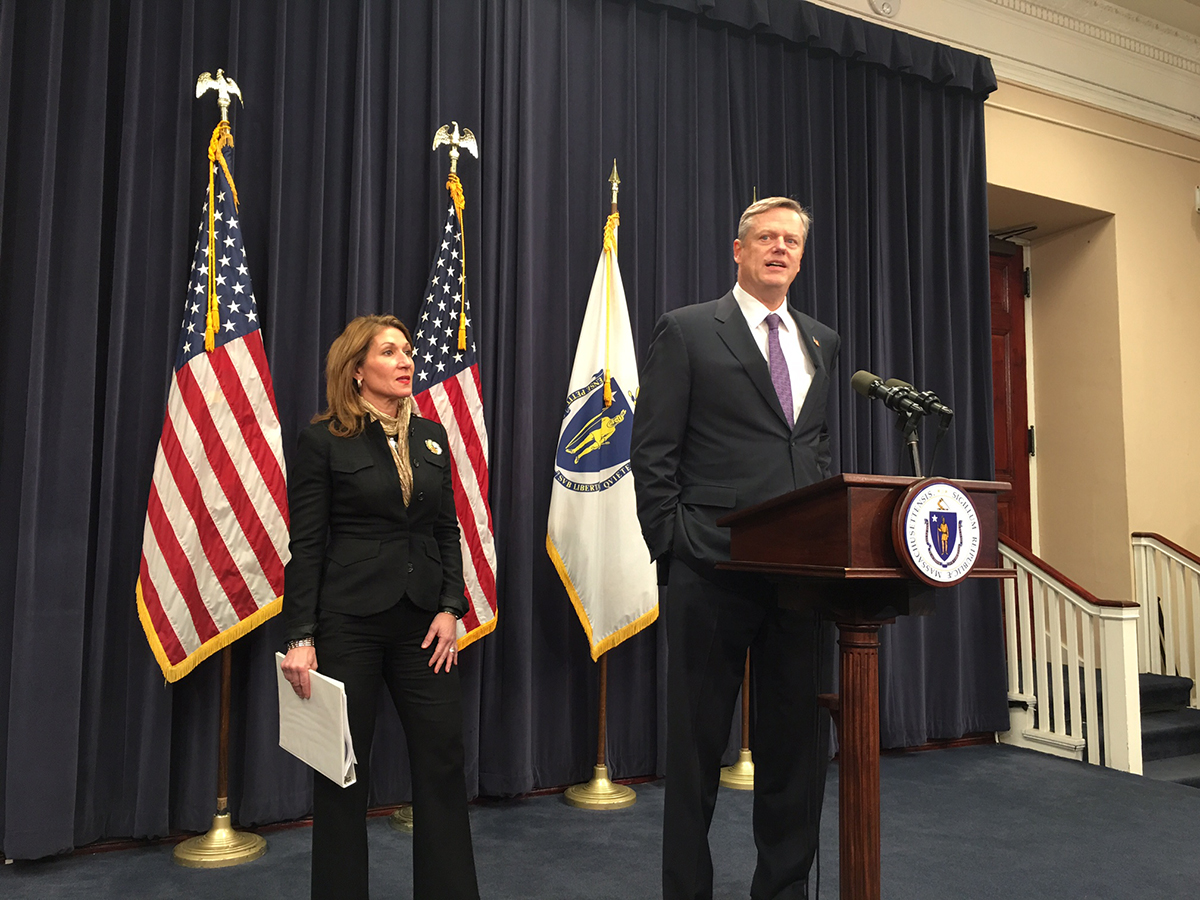Charlie Baker Tries to Reason with Trump on Immigration

Photo by Garrett Quinn
As fired-up activists in Massachusetts continue going for the jugular—challenging the Trump administration’s immigration policy on the street, in airports, and in the courts—Republican Gov. Charlie Baker is trying to reason with the new president and his team.
In a six-page letter he sent to the new Homeland Security Secretary, John Kelly today, Baker made an economy-oriented case against President Trump’s January 27 executive order, which temporarily suspends the refugee program and bans travel to the U.S. for those from seven Muslim-majority countries. He called for the reinstatement of the refugee program, said he opposed “blanket” bans on immigration from entire regions, and urged the White House to go back to the drawing board.
Trump has said that his executive order is necessary to prevent terror attacks. Baker, in the letter, agrees that something needs to be done. He shares the administration’s concern about violence, he says, and supports updates to the immigrant screening process and beefing up border security. He also says it’s time to take a look at tightening regulation of businesses that bring employees here with work visas, to root out abuse.
However, he writes, sweeping decisions like the controversial travel ban aren’t efficient ways of making people safer, and will instead lead to the “unintended consequences” of hurting business, weakening hospitals, colleges, and nonprofits, and killing jobs.
While I believe that changes to the country’s immigration policies are needed to improve national and border security, I wish to highlight some considerations that the Administration should weigh in pursuing any changes, in order to minimize unintended consequences for our economy and the negative effects that more restrictive policies could have on people who have followed the rules, who share our values, and who wish to contribute to our nation’s success.
The letter comes after a week in which his office, and that of Attorney General Maura Healey, talked to leaders in the state about how, specifically, Trump’s aggressive crackdown on immigration would impact them.
Massachusetts businesses, Baker says, are worried about losing top talent to other countries and missing opportunities to grow. Colleges are worried that capable foreign students and professors will no longer seek out colleges here. And hospitals, too, are worried they will suffer by losing out on foreign hires that have helped make them some of the best, and busiest, in the world. Conferences have been cancelled. Some who had been studying or conducting research here, or planned to, are now stranded abroad.
All of that is bad for us, and good for our competitors overseas, Baker writes.
Let there be no doubt that if the United States cedes its place as the global academic leader, other countries, particularly in Europe and Asia, will readily and happily step into the breach and welcome the scholars and innovators from whom Massachusetts and the nation now draw so many advantages.
He countered another claim made by staunch proponents of strict reductions in immigration, including many of his Republican colleagues: that immigrants steal jobs.
Those from abroad are not displacing American workers. They are growing the economic pie for all of us. If some of the most talented individuals in the world are limited in their ability to come to America, they and their talent will go elsewhere.
In the letter, Baker also referenced the Boston Marathon bombings, just a day after word got out that Trump was name-checking the attack with foreign leaders as an argument against accepting refugees. The Tsarnaev brothers were raised here by Chechen parents who sought and were granted political asylum.
Boston and the Commonwealth of Massachusetts know too well the pain of international terrorism. The United States must remain vigilant, and we must continually work to improve the systems we use to stop people who seek to harm us from entering the country, regardless of their country of origin. At the same time, we must recognize that overly broad responses create enormous social and economic costs without meaningfully reducing the very specific dangers they intend to address.
Don’t expect to see him at a protest anytime soon, but it seems like Baker is staying true to his stance that he can do the most good with the White House by finding common ground. Particularly after an election that for many voters was about making things better for American workers, perhaps the president can be swayed by concerns from a former businessman—and a Republican, no less—about jobs.
Read Baker’s entire letter here.


